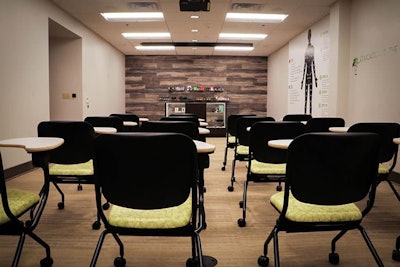
After opening three Pennsylvania dispensaries within the span of three months in 2018, Chris Visco quickly grew TerraVida Holistic Centers into what the company says is the largest woman-owned medical cannabis company in the state. Now, Visco continues to expand her mission through multiple avenues of growth—including a merger in her home state, a newly awarded dispensary license in West Virginia, and myriad other opportunities across the country.
“So many companies are just expanding their footprints and pushing cannabis, but we’re trying to take our time, be responsible, and end the stigma once and for all,” says Visco, president and CEO. “My initiatives are not just about my personal expansion or TerraVida’s expansion, but the expansion of access to medicine.”
With no signs of slowing down anytime soon, Visco is proving that nothing—not even a pandemic or a breast cancer diagnosis—will impede her growth in this industry. Cannabis Dispensary recently caught up with Visco to learn about her ongoing expansion efforts as she works to connect more patients with medical cannabis, while navigating her own personal health journey.
Merging With a Multistate Operator
Born and raised in Montgomery County, Pa., Visco has always been committed to keeping her company locally owned. When she launched TerraVida stores in 2018, she carefully vetted investors to ensure that she’d be able to maintain control of her community-centered dispensaries. But between paying back her investors and paying the hefty tax liabilities that plague cannabis companies, she needed to look elsewhere to fund her growth.
“The only way to expand is to go back to an investor or sell,” she says. “My investors have been good partners but have never been proactive on expansion. So, if I’m going to move to the next level, I need to pull some cash out of the business through a merger.”
Visco has received (and examined) countless offers to merge or acquire TerraVida since 2018. In February, she finally agreed to merge through an equity transfer with Verano Holdings Corp. (CSE: VRNO), a multistate cannabis operator with active operations in 11 states. The merger will double TerraVida’s retail footprint in Pennsylvania by adding three more dispensaries this year, with one slated to open in June and two more in September, plus a license for three additional stores.
RELATED: A Terra-rific Start: How TerraVida Holistic Centers opened three dispensaries in just three months to serve Pennsylvania’s new medical cannabis market.
This merger, which should close in the next couple of weeks, will expand TerraVida’s brand while increasing access for Pennsylvania’s registered medical cannabis patients. Visco says some patients previously drove several hours, past other dispensaries, to experience TerraVida’s compassionate patient care and comprehensive product selection.

“The value that Verano saw in TerraVida was not just our revenue, but our team and our infrastructure,” says Visco, who has 168 employees across three existing locations, with plans to hire another 120 at the three new stores. “The number one thing I promised my team was that I would never sell them out, so my team remains in place and I remain in control of our operations.”
Visco says the Verano merger enables her to fund more growth opportunities for TerraVida without taking investment money or giving up control. Her advice for other dispensaries considering a merger is to “choose your partners carefully, and hire lots of good attorneys,” she says. “Hold your ground, and never, ever take money that takes control away from you.”
Expanding Into New Territory
In the year following the legalization of medical cannabis in Pennsylvania, the state saw a nearly 20% decrease in opioid-related deaths, according to statistics published by the state. Committed to creating a similar impact in other states hit hardest by the opioid epidemic, Visco started exploring opportunities to open a dispensary in West Virginia, the state with the highest rate of opioid-involved deaths in the U.S., according to the National Institute on Drug Abuse.
“I think it’s very important to recognize that cannabis is a community-based industry,” she says. “So I spent a tremendous amount of time in West Virginia, not just looking for a property or thinking about the financial opportunity, but getting to know the people, finding out what they need, and understanding how we can be helpful.”
Based on the community needs she identified in Huntington, W.V., Visco self-funded a dispensary license application in February 2020 and received her permit about one year later. Her company, West Virginia Kindness, will operate one of the first medical cannabis dispensaries in the state when it opens later this year. The 5,000-square foot store, which will be branded as TerraLeaf (no affiliation with TerraVida), sits across the street from Marshall University’s football stadium—a strategic location that offers plenty of parking while providing opportunities to “spread awareness to the next generation about the opioid crisis and the responsible use of cannabis,” Visco says.

TerraLeaf medical cannabis dispensary is slated to open toward the end of 2021. Photo courtesy of TerraVida
Although Visco doesn’t expect product to hit West Virginia’s market until mid-fourth quarter, she says her store will be deemed operational by summer, so she plans to host educational events there in the meantime. She’s already thinking ahead to future growth opportunities as the state’s legal cannabis market takes shape.
“We fully expect West Virginia to legalize an adult-use market,” she says. “So the way I structured the facility is that we will open part of it as medical; the other part will open as an education center for now, with the plan to turn it into our adult-use space. I’m being more proactive in this facility design so that when they do legalize, I can knock down a wall and I’m ready to go.”
Growing Into the Future
Compassionate patient care has always been Visco’s top priority in all her dispensaries. But when she became a patient herself, following a diagnosis of stage two breast cancer in January 2020, she gained a whole new perspective of the patient experience.
“Before I was diagnosed, I was pounding the pavement, talking about the value of cannabis to anybody who would listen,” she says. “When I was diagnosed, my first thought was, well, I need to put my money where my mouth is and do everything I can to prove that this medicine can help.”
Visco “chose to start cannabis treatment without chemotherapy,” taking Rick Simpson Oil (RSO) to manage her symptoms and says that her tumors shrunk by 20%. Now, 15 months and one surgery later, she’s cancer-free. “The story is great, but more importantly, I was able to recognize the pain that my patients go through—not just physically, but mentally,” she says. “During my treatment, I recognized how isolating it is to be chronically ill. People don’t understand holistic treatment, so medical marijuana patients have a lot of hurdles to overcome.”
Motivated to help more patients access medical cannabis products to ease a spectrum of symptoms, Visco is constantly on the lookout for more opportunities to help patients find relief. For example, she plans to be operating a dispensary in Missouri by 2022, with other applications pending in Illinois and New Jersey, along with a possible operation in New York.
“When I drove through Missouri last summer, I saw such a need, A) for the medicine, and B) for good jobs there,” she says. “It’s another community that’s really craving access for their patients, and those are the types of markets I’m interested in going into, where the need is the greatest.”
In addition to multistate retail expansion, Visco is also eyeing the cultivation side of the business, with a cultivation application pending in Illinois, and investment opportunities brewing in both West Virginia and Missouri, that could have her growing (in the literal sense) by the end of the year.
“I opened three dispensaries in three months,” she says. “I’ve got this down pat now.”












.png?auto=format%2Ccompress&fit=crop&h=141&q=70&w=250)













